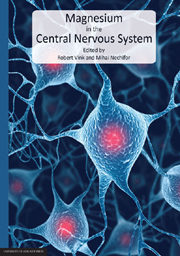Book contents
- Frontmatter
- List of Contributors
- Preface
- Contents
- Section 1 Magnesium in Normal Brain
- Section 2 Magnesium in Neurological Diseases
- Section 3 Involvement of Magnesium in Psychiatric Diseases
- Chapter 18 Magnesium and Alzheimer's disease
- Chapter 19 Magnesium and stress
- Chapter 20 Magnesium in neuroses
- Chapter 21 Magnesium, hyperactivity and autism in children
- Chapter 22 Magnesium in psychoses (schizophrenia, bipolar disorder)
- Chapter 23 Magnesium and major depression
Chapter 18 - Magnesium and Alzheimer's disease
from Section 3 - Involvement of Magnesium in Psychiatric Diseases
Published online by Cambridge University Press: 05 June 2012
- Frontmatter
- List of Contributors
- Preface
- Contents
- Section 1 Magnesium in Normal Brain
- Section 2 Magnesium in Neurological Diseases
- Section 3 Involvement of Magnesium in Psychiatric Diseases
- Chapter 18 Magnesium and Alzheimer's disease
- Chapter 19 Magnesium and stress
- Chapter 20 Magnesium in neuroses
- Chapter 21 Magnesium, hyperactivity and autism in children
- Chapter 22 Magnesium in psychoses (schizophrenia, bipolar disorder)
- Chapter 23 Magnesium and major depression
Summary
Abstract
Alzheimer's disease (AD) is the most common form of dementia. It is characterized by a progressive cognitive impairment clinically, and excessive deposits of aggregated amyloid-β (Aβ) peptides pathologically. Environmental factors, including nutrition and metal elements, are implicated in the pathophysiology of AD. Magnesium (Mg) affects many biochemical mechanisms vital for neuronal properties and synaptic plasticity, including the response of N-methyl D-aspartate (NMDA) receptors to excitatory amino acids, stability and viscosity of the cell membrane and antagonism of calcium. Mg levels were found decreased in various tissues of AD patients and negatively correlated with clinical deterioration. Moreover, Mg was demonstrated to modulate the trafficking and processing of amyloid-β precursor protein (APP), which plays a central role in the pathogenesis of AD. Here, we review in vitro and in vivo data that indicated a role for magnesium in many biological and clinical aspects of AD.
Alzheimer's disease
Alzheimer's disease (AD) is the most prevalent neurodegenerative disease in elderly people, affecting approximate 6∼8% of all individuals over the age of 65 years. AD is characterized by progressive cognitive impairment and distinct neuropathological lesions in the brain, including intracellular neurofibrillary tangles, extracellular parenchymal and cerebrovascular senile plaques (Braak and Braak, 1991).
- Type
- Chapter
- Information
- Magnesium in the Central Nervous System , pp. 239 - 250Publisher: The University of Adelaide PressPrint publication year: 2011
- 6
- Cited by

